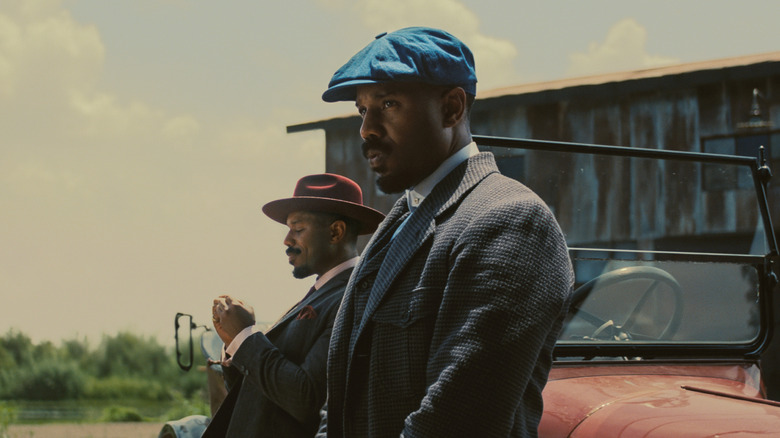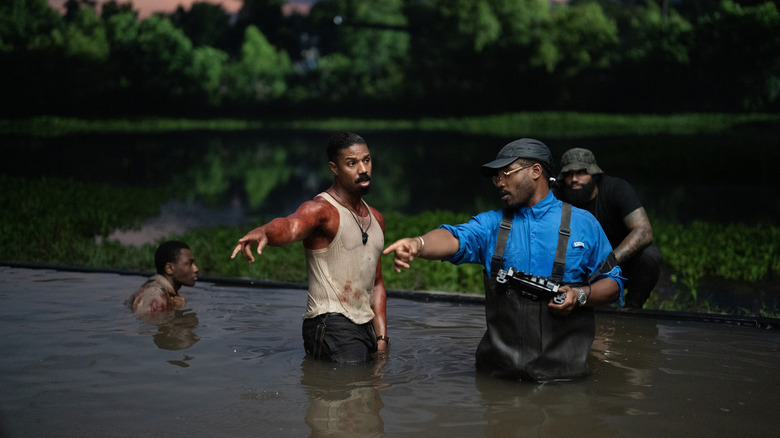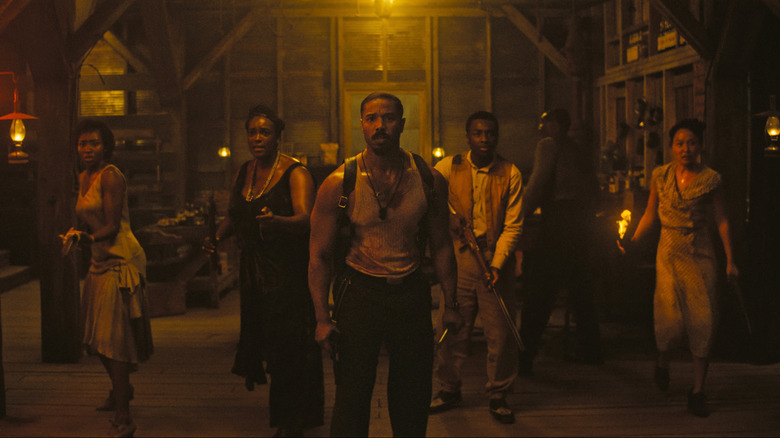With Sinners, Director Ryan Coogler Evolves Jordan Peele's Very Specific Horror Mission
Warning: This article contains major spoilers for "Sinners."
Nobody's doing what Jordan Peele and Ryan Coogler are doing in genre films these days — and that goes for Peele and Coogler themselves, too. Despite some similarly recurring themes and generally shared interests, not even the most casual of moviegoers could mistake them as the exact same kind of filmmaker. The former burst onto the scene with one extremely ambitious original after another, becoming a brand name all to himself overnight. The latter has spent the last decade surviving and thriving within the studio system after debuting with a Sundance hit, elevating each production with a level of craft and passion that blockbusters so rarely receive. These are two very different storytellers doing very different things, and it'd be foolish for anyone to conflate their abilities for the most superficial of reasons.
That's not to say their work can't exist in a dialogue with one another, however. If there's anything linking the two inextricably together, it's in how they both use the guise of pop entertainment to sneak in much more potent ideas about race and inequality in America. And, in many ways, the release of Coogler's "Sinners" (which I reviewed glowingly for /Film here) feels like the apotheosis of a horror approach that Peele helped pioneer with the one-two-three punch of "Get Out," "Us," and "Nope." Where the villains of Peele's films are so often terrifyingly human (yes, including "Nope," as the Gordy scenes make clear), Coogler's latest features actual monsters ripped straight out of our oldest and most unsettling nightmares. And by adding a unique twist on vampire mythology, turning this traditional metaphor for lust and temptation into a metaphor for feasting on the bones of Black culture itself, "Sinners" achieves something far more important than its nearly-perfect Rotten Tomatoes score or the angst surrounding its opening weekend box office numbers.
When the smoke clears, we may very well end up looking back at Coogler's work on "Sinners" as the next evolution of Peele's specific mission in the horror space — and we couldn't be more excited about it.
With Sinners, Ryan Coogler is picking up what Jordan Peele put down in Get Out
How far can movies go in terms of proving themselves as empathy machines, as critic Roger Ebert once put it so succinctly? Both Jordan Peele and Ryan Coogler seem fully intent on finding out. Take 2017's "Get Out," for instance, which first proved beyond a doubt that the former "Comedy Central" star could take his talents to the medium of movies and use the visual language of cinema like a weapon. What else would you call successfully getting audiences of all stripes and political beliefs to fully empathize with the Black perspective, to the extent that we would all react with collective dread at the arrival of a police car during the last scene of that film? In "Sinners," Coogler doesn't merely take a page out of the Peele playbook so much as he adds reams of supplementary material altogether.
What Coogler pulls off with "Sinners" might as well be that "Get Out" sequence writ large. He lures viewers in with the promise of a traditional vampiric tale, before turning it entirely on its head and forcing us to reckon with the most pervasive parasite of all: society's gatekeepers constantly stealing from its most marginalized voices. Although we follow Michael B. Jordan in his dual roles as twin brothers Smoke and Stack, the real star of the story turns out to be Miles Caton's scene-stealing Sammie Moore. The film opens with him covered in blood and clutching the broken neck of his beloved guitar, while his preacher father berates him and urges him to put the guitar down — and, by extension, his musical prodigy talents — for good. The opening voiceover narration by Wunmi Mosaku's Annie quickly explains how certain artists create music so powerful that it essentially serves as a gateway between the past and future, uniting cultures together far beyond the constraints of space and time ... yet, pointedly, this is also attracts Jack O'Connell's insatiable villain Remmick and his cohort of fanged friends out of the woodwork.
Here, the typical bloodlust of vampires is given a more modern facelift and grafted onto a topic that's all too relevant these days. By taking what people of color face on an everyday basis and extending it to the entrenched lore of vampires, "Sinners" transcends its own genre conventions. In the process, it becomes something more.
Sinners is about Black identity, ownership, and autonomy -- and the villains trying to take it for themselves
There's a good reason why Ryan Coogler called "Sinners" his most personal film to date. Music played a crucial role in his life and in Black history overall, which is reflected in a movie that alternately treats music as an expression of several aspects at once: passion, defiance, sensuality, dreams, connection, and everything in between. All of this comes to a head when Sammie performs at the newly-opened juke joint and promptly blows the roof off the place (almost literally, as Coogler films this long-take sequence with a heightened, dreamlike atmosphere full of burning embers and anachronistic imagery). When this inevitably means that the vampires come knocking at the door, however, we find out that they're not simply out for blood — these white (and, in the case of Hailee Steinfeld's Mary, white-passing) individuals want to absorb every aspect of their Black victims. Though preaching a fantasy world where vampires can live as one and be "together forever," Remmick sneers at Sammie during the climactic final act in a moment of naked revelation: "I want your stories; I want your songs."
If you have never before understood the controversy surrounding Elvis Presley allegedly co-opting Black folk music for many of his own songs, well, "Sinners" puts real-world issues like that in sharp relief in a way that would likely make Jordan Peele proud. In 2017, the year after a turbulent US Presidential election, Peele came out of the gate swinging with a quintessential take on the festering racism at the heart of America. Now, a year after yet another US Presidential election that has set our clocks back eight years, Coogler has released a thinly-veiled commentary on the nation's racial animus that has only increased over time. Both "Sinners" and "Get Out" go about these concerns in incredibly unique ways, but there's no denying the shared legacy that both filmmakers continue to foster — one that makes us thrilled to see where they each go next.
"Sinners" is now playing in theaters everywhere.


